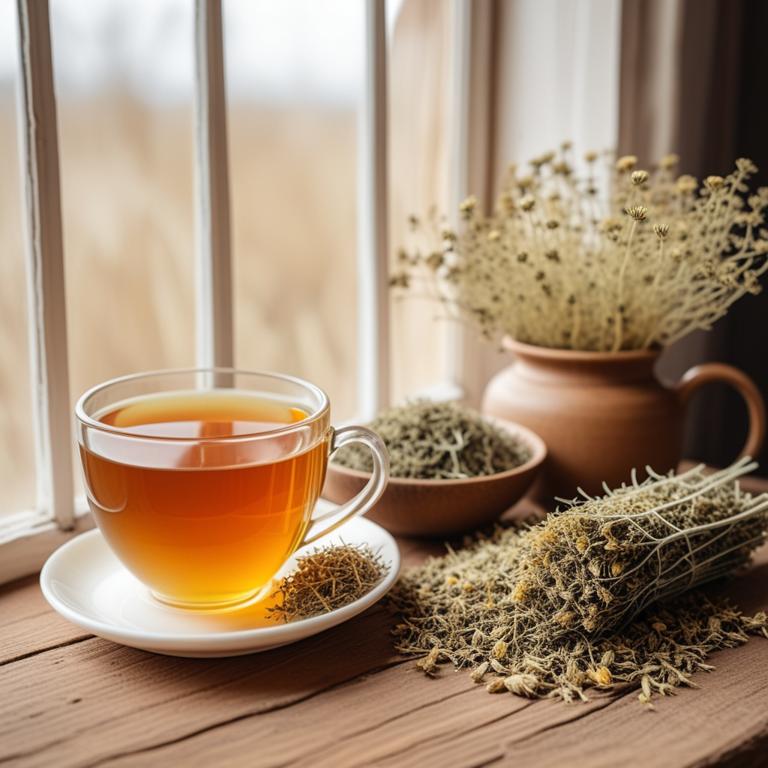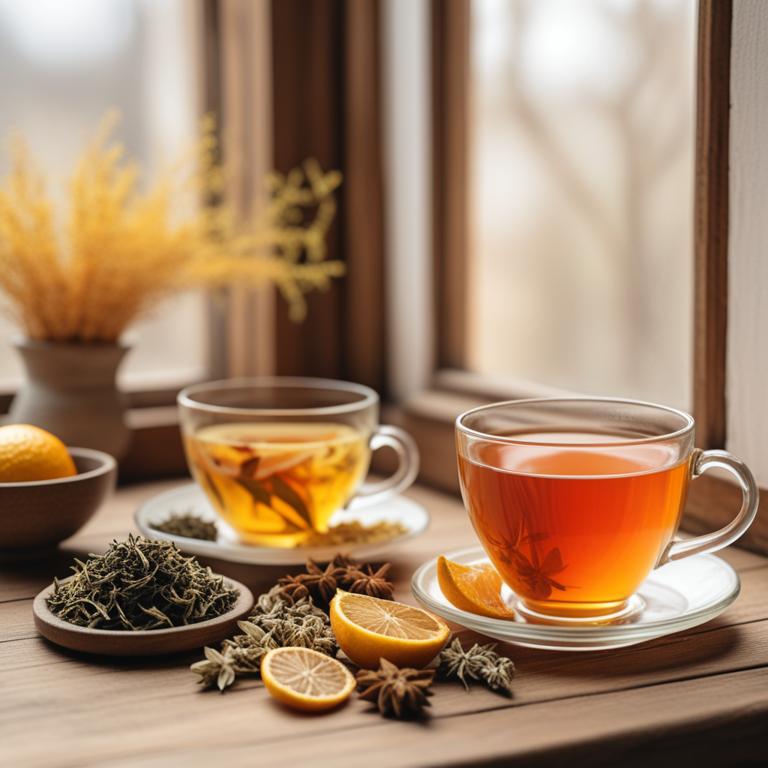7 Best Herbal Teas For Motion Sickness

Herbal teas for motion sickness are natural remedies that help alleviate the symptoms of nausea, dizziness, and disorientation associated with motion sickness.
These teas are often made from a variety of herbs that have been traditionally used to treat digestive issues and promote relaxation, such as peppermint, ginger, chamomile, and lemongrass.
The benefits of using herbal teas to treat motion sickness include their ability to calm the stomach, reduce anxiety, and improve circulation, making them a popular alternative to over-the-counter medications.
Examples of herbal teas that can be used to treat motion sickness include peppermint tea, which helps to calm the digestive system, ginger tea, which aids in digestion and reduces nausea, and licorice root tea, which has anti-inflammatory properties and helps to soothe the stomach.
According to "ORL; journal for oto-rhino-laryngology and its related specialties", teas for motion sickness may be beneficial, as ginger root, a common ingredient in teas, has been shown to reduce induced vertigo significantly better than a placebo in a double-blind crossover trial.
Below there's a list of the 7 best herbal teas for motion sickness.
- 1. Mentha x piperita teas
- 2. Rosmarinus officinalis teas
- 3. Ammi visnaga teas
- 4. Hypericum perforatum teas
- 5. Valeriana officinalis teas
- 6. Zingiber officinale teas
- 7. Citrus reticulata teas
Also you may be interested in...
TODAY'S FREE BOUNDLE
Herb Drying Checklist + Herbal Tea Shopping List + Medicinal Herbs Flashcards
Enter you best email address below to receive this bundle (3 product valued $19.95) for FREE + exclusive access to The Aphotecary Letter.
$19.95 -> $0.00
1. Mentha x piperita teas

Mentha x piperita teas, also known as peppermint tea, have been traditionally used to treat motion sickness due to their calming and anti-inflammatory properties.
The herbal preparation helps to alleviate nausea and vomiting associated with motion sickness by reducing stomach spasms and regulating digestive enzymes.
The bioactive constituents, including menthone and menthol, in peppermint tea help to relax the stomach muscles and reduce nausea by blocking the serotonin receptors that trigger vomiting.
The benefits of using peppermint tea for motion sickness include its non-invasive nature, minimal side effects, and ability to provide quick relief, making it a popular natural remedy for travelers and individuals prone to motion sickness.
2. Rosmarinus officinalis teas

Rosmarinus officinalis teas have been traditionally used to treat motion sickness, a common complaint experienced by travelers.
The properties of this herbal preparation, particularly its carminative and anti-inflammatory effects, help to alleviate nausea and vomiting associated with motion sickness.
The bioactive constituents of Rosmarinus officinalis, including rosmarinic acid, apigenin, and linalool, possess anti-emetic and sedative properties that contribute to its effectiveness in treating motion sickness.
By consuming Rosmarinus officinalis teas, individuals can benefit from reduced nausea, improved digestion, and a more comfortable travel experience.
3. Ammi visnaga teas

Ammi visnaga teas have been traditionally used to treat motion sickness, a common ailment characterized by dizziness, nausea, and vomiting caused by travel or other forms of motion.
The anti-inflammatory and antispasmodic properties of ammi visnaga teas help to treat motion sickness by reducing the spasms in the stomach and intestines, thereby alleviating nausea and vomiting.
The bioactive constituents of ammi visnaga teas, including coumarins and alkaloids, have been found to contribute to its effectiveness in treating motion sickness by modulating the body's response to motion and reducing the symptoms associated with it.
The benefits of using ammi visnaga teas to treat motion sickness include its natural and non-invasive approach, making it a popular alternative to pharmaceutical treatments.
4. Hypericum perforatum teas

Hypericum perforatum teas, also known as St. John's Wort tea, have been traditionally used to treat motion sickness due to their anti-inflammatory, antioxidant, and antispasmodic properties.
The bioactive constituents, such as hyperforin, hypericin, and flavonoids, help to calm the nervous system, reduce nausea and vomiting, and alleviate dizziness associated with motion sickness.
By consuming Hypericum perforatum teas, individuals can experience relief from motion sickness symptoms, allowing them to travel comfortably without experiencing debilitating side effects.
The benefits of using Hypericum perforatum teas for motion sickness include its natural and non-addictive nature, making it a popular alternative to pharmaceutical treatments.
5. Valeriana officinalis teas

Valeriana officinalis teas have been traditionally used to treat motion sickness due to their calming and sedative properties, which help to alleviate nausea and vomiting associated with this condition.
The bioactive constituents, such as valerenic acid, isovalerenic acid, and valepotriates, present in Valeriana officinalis teas, are responsible for their therapeutic effects.
These compounds help to reduce stress and anxiety, regulate the gut, and prevent the symptoms of motion sickness from occurring.
The benefits of using Valeriana officinalis teas to treat motion sickness include natural relief from nausea and vomiting, reduced anxiety and stress, and a non-addictive and non-habit-forming treatment option.
Related Study
According to the study, Valeriana officinalis teas, along with hops and passionflower, showed the best results in clinical tests.
6. Zingiber officinale teas

Zingiber officinale teas, derived from the rhizomes of the ginger plant, have been traditionally used to alleviate symptoms of motion sickness, a common affliction experienced during travel.
The anti-inflammatory and antispasmodic properties of ginger help to treat motion sickness by reducing nausea, vomiting, and dizziness.
Bioactive constituents such as gingerols and shogaols, responsible for the therapeutic effects of ginger, have been identified as key players in relieving motion sickness symptoms.
The benefits of using Zingiber officinale teas to treat motion sickness include rapid relief from nausea and vomiting, reduced anxiety and stress, and a soothing effect on the digestive system.
Related Study
According to ORL; journal for oto-rhino-laryngology and its related specialties, Zingiber officinale teas for motion sickness have been shown to significantly reduce induced vertigo in healthy volunteers, outperforming a placebo.
7. Citrus reticulata teas

Citrus reticulata teas, derived from the peel of the citrus fruits, have been traditionally used to treat motion sickness due to their unique properties that help alleviate nausea and vomiting.
The herbal preparation contains bioactive constituents such as limonene, linalool, and geranial, which possess anti-inflammatory and sedative properties that help to calm the stomach and reduce symptoms of motion sickness.
By reducing the frequency and severity of nausea and vomiting, Citrus reticulata teas provide relief from the discomfort and distress associated with motion sickness, allowing individuals to travel comfortably without the risk of dehydration and electrolyte imbalance.
The benefits of using Citrus reticulata teas to treat motion sickness include a natural and non-pharmacological approach, minimal side effects, and the ability to be consumed in various forms, such as tea or capsules, making it a convenient and accessible remedy for those who experience motion sickness.